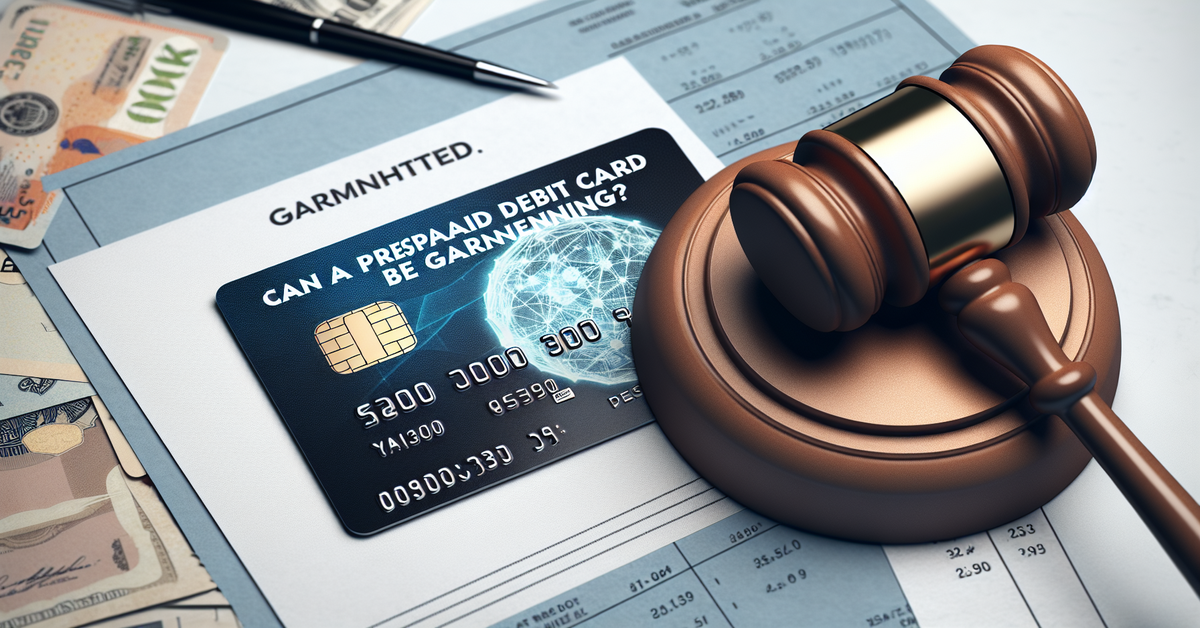Did you know that nearly 10% of Americans use prepaid debit cards as a primary banking method? While these cards offer convenience, they also raise important questions about your financial security, particularly regarding garnishment. You might be surprised to learn that the answer isn't straightforward, as it hinges on various factors like state laws and the source of the funds. So, what happens if a creditor comes knocking? Understanding the implications can be essential for protecting your assets.
Understanding Prepaid Debit Cards
Prepaid debit cards, which you load with funds in advance, offer a convenient way to manage your spending without the need for a traditional bank account. They're particularly useful for budgeting, as you can only spend what you've loaded onto the card, helping you avoid overspending and debt. Additionally, these cards often come with safety features like PIN protection and fraud monitoring, making them a secure choice for your financial transactions. Unlike credit cards, there's no risk of accumulating debt since you're limited to your loaded balance. They're also widely accepted, enhancing your purchasing flexibility while maintaining control over your finances. However, it's important to understand the terms and fees associated with these cards to guarantee they meet your needs effectively.
Legal Framework for Garnishment
Garnishment laws vary by state, impacting how creditors can access funds in your accounts, including prepaid debit cards. These laws determine the procedures creditors must follow to legally seize funds, which can greatly affect your financial security. Generally, a creditor must obtain a court order before garnishing your account. However, certain exemptions may apply, depending on the nature of the funds—such as government benefits—which can offer you some protection. It's vital to understand your state's specific regulations to know how they apply to your situation. By staying informed about these laws, you can better navigate potential risks and safeguard your assets against creditor actions. Knowing your rights is essential for maintaining your financial safety in uncertain times.
Ownership and Card Issuer Impact
Understanding the ownership of funds on a prepaid debit card and the role of the card issuer can significantly influence how garnishment laws apply to your financial situation. When evaluating potential garnishment, it's essential to reflect on who legally owns the funds and how the card issuer operates.
| Aspect | Owner of Funds | Card Issuer's Role |
|---|---|---|
| Legal Ownership | Individual Account Holder | Provides access to funds |
| Garnishment Impact | May protect funds if they are exempt | Can facilitate or hinder garnishment |
| Safety Measures | Know your balance limits | Review issuer policies for protection |
Types of Debts and Garnishment
Certain types of debts can lead to garnishment of funds, affecting how much you can access on your prepaid debit card. Common debts that may result in garnishment include unpaid taxes, child support obligations, and certain court judgments. If you've defaulted on loans or owe money to creditors, they may seek legal action to collect what you owe. This usually involves obtaining a court order that allows them to access your funds. It's essential to understand that while some debts can be garnished, not all prepaid debit cards are equally vulnerable. Knowing the types of debts that can lead to garnishment helps you take preventative measures and better manage your finances, ensuring you're prepared should any legal actions arise.
State Laws and Variations
State laws vary considerably regarding the garnishment of prepaid debit cards, which can impact your access to funds depending on where you live. Some states may allow creditors to garnish funds stored on these cards, while others may protect them under specific exemptions. For instance, in states with strong consumer protection laws, your prepaid card balance might be shielded from garnishment, especially if the funds come from government benefits like Social Security. Conversely, in states with fewer protections, creditors could potentially access your prepaid card funds. It's crucial to understand your state's laws, as this knowledge can help you navigate your financial situation more effectively and safeguard your resources against unexpected garnishments.
Protecting Your Assets and Rights
Protecting your assets and rights from garnishment requires a proactive approach to managing your finances and understanding legal protections available to you. Start by keeping your money in accounts that are less susceptible to garnishment, like certain retirement accounts or joint accounts with exempt funds. Educate yourself on state-specific exemptions; some states protect a portion of your income or specific asset types. If you face potential garnishment, consider consulting with a legal professional who specializes in debt collection laws. They can help you navigate your options and possibly challenge any wrongful garnishments. Finally, stay organized by documenting all financial transactions and communications with creditors, ensuring you're prepared to defend your rights should the need arise.

